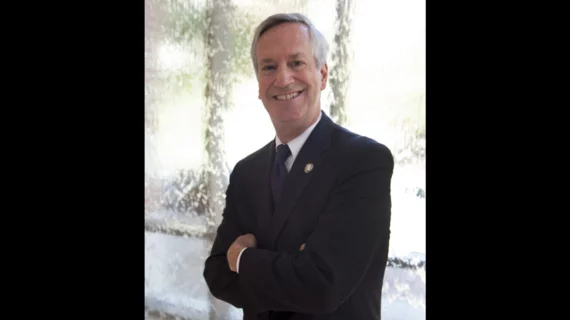B. Hadley Wilson, MD, an interventional cardiologist with decades of experience leading cath labs and providing care to low- and middle-income countries, is the newest president of the American College of Cardiology (ACC). The move became official at the end of the ACC’s annual meeting, ACC.23 Together with the World Congress of Cardiology, when Wilson took over the position previously held by Edward T.A. Fry, MD.
Wilson is a practicing interventional cardiologist and executive vice chair at Sanger Heart and Vascular Institute/Atrium Health in Charlotte, North Carolina, and a clinical professor of medicine at Wake Forest University School of Medicine. He has held numerous leadership positions in his 25 years with the ACC, including being a senior advisor to the ACC Global Heart Attack Treatment Initiative, and traveled to countries such as Haiti, Panama and Nicaragua to help local clinicians boost outcomes.
Cardiovascular Business caught up with Wilson at ACC.23 to discuss what he has planned for his one-year term. One of his biggest priorities, he shared, is to engage with the group’s members both in the United States and all over the world.
“About one-third of our members reside outside of the United States, so we are a real global organization,” he said. “I’m very encouraged and enthusiastic, particularly in a post-pandemic world, to continue the ACC’s growth in that direction and have a real global impact.”
Wilson also wants to get more ACC members involved in different committees and work groups. The increased popularity of regional meetings and webinars, for example, provide new opportunities for cardiologists to take on new responsibilities and help educate their peers about how to provide better patient care.
One of Wilson’s other goals is to continue and potentially complete the ACC’s ongoing digital transformation. He said all of the ACC’s resources—from its data and membership roster to its recommendations and journals—are being organized digitally so that they are readily available to all members.
“The digital transformation should be a tremendous boon for how we interact internally, how we communicate with our members and how our members can access information from us,” Wilson said. “We want our members to get point-of-care information from us, whenever they need it, that is superior to what they would find on Google or other similar resources.”
Wilson also discussed the importance of identifying and treating underserved patient populations, which has been a key focus of his work for many years. For example, he noted that researchers are beginning to make real progress in identifying and treating more Black patients with severe aortic stenosis and atrial fibrillation. These are two conditions that have been historically undertreated among Black patients and other minority groups, leading to deaths and other adverse events that could be avoided altogether.
Additional details about Wilson’s work on improving health disparities
Wilson also spoke to Cardiovascular Business back in November 2022 at the American Heart Association’s Scientific Sessions 2022 to discuss his work on improving health disparities all over the world. With his colleagues at the Sanger Heart and Vascular Institute, for instance, he targeted hypertension issues among lower income patients with a “boot camp” program aimed at improving blood pressure levels.
Click here for the full story.

